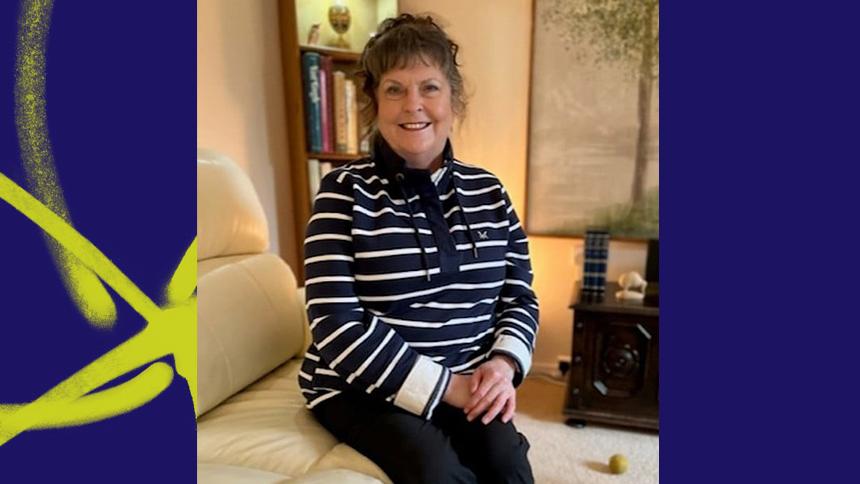Problem solving with posterior cortical atrophy (PCA)
Martina Davis in Cumbria, aged 64 with posterior cortical atrophy (PCA), explains how she deals with the challenges of this rarer form of dementia.
Having posterior cortical atrophy (PCA) is challenging, that’s for sure. You might have awful brain fog for hours, days, weeks, where you can’t think clearly. You become exhausted from the visual and spatial challenges.
I look at something busy, like kitchen tiles, and can then see it everywhere else I look. Or there’s a work surface that I know is perfectly straight, but I see it as being at an angle. You know where you put your phone or keys down, but you can’t actually see them.
My hand–eye co-ordination has its memorable moments! But it’s not my actual eyesight that causes problems, it’s the brain messages – my ‘brain sight’.

Problem solving
Initially, I was black and blue walking into things, but I’ve mastered it now.
There was one narrow doorway in the house that I never had any problems getting through.
On the wall opposite there is a string of hanging onions, and it turns out I was using that as a centre point. So I’ve stopped fighting the symptoms and started creating habits.
Problem solving has become a way of my PCA life.
I think previously being self-employed has helped. When you’re self-employed, you’re chief cook and bottle washer – you’re the whole bit. So I’ve always had to problem solve and think and plan.
I lost the ability to write with my left hand, so I taught myself to write with my right hand.
But that’s going into a slight decline now as well, so I’m thinking about assistive technology. I was burning my hand on the oven, so now I use a one-pot multi-cooker. I’ve stopped the battle of trying to read and have gone to audio books.
Awards judge
When I got diagnosed in December 2019, the memory clinic referred me to Alzheimer’s Society.
The Society support worker was great – she listened, and I wasn’t made to feel anything other than me.
She understood that PCA was different to Alzheimer’s and acknowledged the skills I could still put to use.
I’m on the steering group for 3NDWG (the 3 Nations Dementia Working Group), I’m part of a Dementia Voice group and I’ve sat on an Alzheimer’s Society interview panel. I’m also going to be a judge for next year’s Dementia Hero Awards and I’m supporting the Society’s Accelerator Programme.
Alzheimer’s Society has been a really good support mechanism that’s helped me be proactive.
Other directions
PCA has actually allowed a huge creative side of me to come through. I wrote a book of poetry about what PCA is like, and it got published! That was a great achievement. It acknowledged that you can still go in other directions.
PCA doesn’t stop you moving forward, but you have to get past the acknowledgement and acceptance. It’s about starting to live your best life with what you’ve got and what you can do.
I want people to feel that you can still have a life – it is possible.


Lorraine
saysKim Norris
saysDawn Jones
says